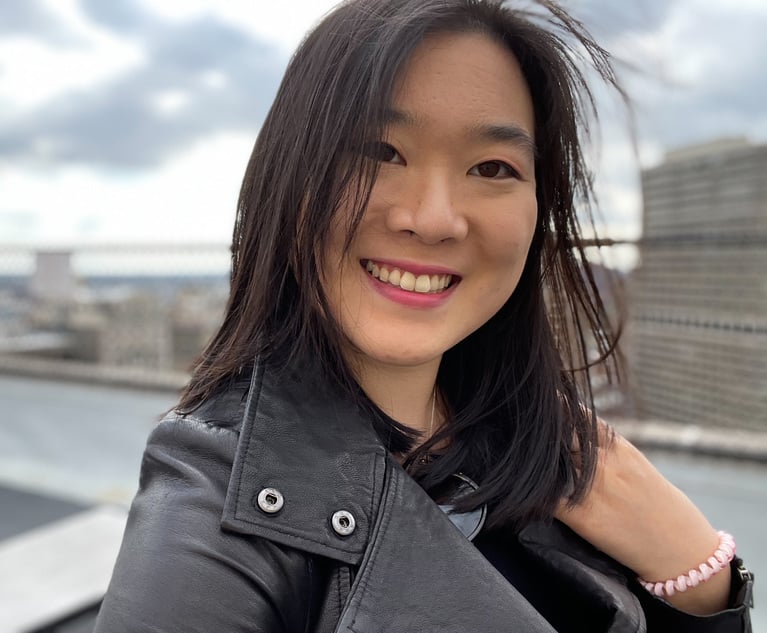 Natalie Friend Wilson, with Langley & Banack.
Natalie Friend Wilson, with Langley & Banack.On the Rise 2018: Natalie Friend Wilson
Natalie Friend Wilson, associate, Langley & Banack
August 31, 2018 at 06:00 AM
4 minute read
Natalie Friend Wilson, associate, Langley & Banack
Experience:
- Langley & Banack, 2010-present
- Moseley Biehl Tsugawa Lau & Muzzi, 2010
- State of Hawaii, Hon. Simeon R. Acoba, Jr. 2007-2008
Education:
- University of Hawaii William S. Richardson School of Law, 2007
- St. Mary's College of Maryland, 2004
What drew you to a career in law?
As an undergraduate, the leadership seminar that I took part in studied the differences in environmental regulation between Baltimore, Houston, and Shanghai, which piqued my interest in environmental policy and regulation. I went to the University of Hawaii specifically for their Environmental Law program and earned the Environmental Law Certificate. I hoped to work in environmental policy and compliance. Then Lehman Brothers filed for bankruptcy just as I was finishing my judicial clerkship and I was thrust into the world of insolvency and restructuring where I discovered a passion I never even guessed was possible.
Have you set a specific goal that you want to achieve in the next year?
I am learning as much as I can about Blockchain and cryptocurrencies because I think it's going to have a huge impact on insolvency law very shortly.
What has been your proudest career moment and your biggest hurdle? The first case that I worked on when I moved to Texas involved the sale of a small, local refinery. That successful reorganization saved almost 500 jobs in our community, and some of those employees are literally my neighbors. That was a great feeling.
My biggest career hurdle has been balancing a legal career with my husband's active duty military career, which requires him to travel frequently and sometimes for long periods of time. I'm fortunate that I've only had to sit for two bar exams, but on average, military families move every 2-3 years and that geographic instability has a major detrimental effect on career trajectory.
Where do you fit on a 1-10 work-life balance scale with 10 being nirvana? Please explain.
I'm pretty close to a 9. With an active duty spouse and 4 young children, there are a lot of competing demands on my time. I'm fortunate that my family is very proud of my career and supports my ambitions and that my Firm is equally supportive and allows me a great deal of flexibility. Striking this balance isn't always easy and it involves logging in after my kids go to bed and working on weekends, but it works well for our family.
What is the top quality that you've used to succeed in the profession?
Flexibility. Being flexible led me into a totally different career field than what I envisioned and also helped me adapt when I had to move halfway across the country to a town where I had no professional network. Flexibility also helps me adapt when a case throws a curveball, which they inevitably do.
Who is your favorite mentor and why?
I am eternally grateful for the late Glen Ayers. He was an incredibly knowledgeable lawyer, an effective advocate, a generous teacher, and above all else, a devoted friend. He taught me a great deal about the law, and even more about being a good lawyer.
What's the best advice anyone has ever given you?
My Dad used to tell me “Do your head work” which means to make sure you've considered your course of action, all viable alternatives, and what could go wrong before you put your plan into action. It's good advice for life and for the practice of law.
What trends are you observing in the profession that you're excited about?
Increasing remote work options. I think these are great for people looking for a different work-life balance and it offers the possibility of income stability and career progressions for very mobile military spouses.
What is the greatest challenge you see for the legal profession?
Structuring financially viable firms that aren't dependent on the billable hour. I think there are exciting possibilities that could be win-win-win for firms, lawyers, and clients, but it's a daunting task to restructure the financial model of an entire industry.
This content has been archived. It is available through our partners, LexisNexis® and Bloomberg Law.
To view this content, please continue to their sites.
Not a Lexis Subscriber?
Subscribe Now
Not a Bloomberg Law Subscriber?
Subscribe Now
NOT FOR REPRINT
© 2024 ALM Global, LLC, All Rights Reserved. Request academic re-use from www.copyright.com. All other uses, submit a request to [email protected]. For more information visit Asset & Logo Licensing.
You Might Like
View All
Advising 'Capital-Intensive Spaces' Fuels Corporate Practice Growth For Haynes and Boone
4 minute read
Get to Know Texas Lawyer's Attorney of the Year Finalists


With a 7-Figure Book Deal and TV Adaptation on the Way, This Dechert Associate Remains Committed to Her Day Job
Trending Stories
Who Got The Work
Michael G. Bongiorno, Andrew Scott Dulberg and Elizabeth E. Driscoll from Wilmer Cutler Pickering Hale and Dorr have stepped in to represent Symbotic Inc., an A.I.-enabled technology platform that focuses on increasing supply chain efficiency, and other defendants in a pending shareholder derivative lawsuit. The case, filed Oct. 2 in Massachusetts District Court by the Brown Law Firm on behalf of Stephen Austen, accuses certain officers and directors of misleading investors in regard to Symbotic's potential for margin growth by failing to disclose that the company was not equipped to timely deploy its systems or manage expenses through project delays. The case, assigned to U.S. District Judge Nathaniel M. Gorton, is 1:24-cv-12522, Austen v. Cohen et al.
Who Got The Work
Edmund Polubinski and Marie Killmond of Davis Polk & Wardwell have entered appearances for data platform software development company MongoDB and other defendants in a pending shareholder derivative lawsuit. The action, filed Oct. 7 in New York Southern District Court by the Brown Law Firm, accuses the company's directors and/or officers of falsely expressing confidence in the company’s restructuring of its sales incentive plan and downplaying the severity of decreases in its upfront commitments. The case is 1:24-cv-07594, Roy v. Ittycheria et al.
Who Got The Work
Amy O. Bruchs and Kurt F. Ellison of Michael Best & Friedrich have entered appearances for Epic Systems Corp. in a pending employment discrimination lawsuit. The suit was filed Sept. 7 in Wisconsin Western District Court by Levine Eisberner LLC and Siri & Glimstad on behalf of a project manager who claims that he was wrongfully terminated after applying for a religious exemption to the defendant's COVID-19 vaccine mandate. The case, assigned to U.S. Magistrate Judge Anita Marie Boor, is 3:24-cv-00630, Secker, Nathan v. Epic Systems Corporation.
Who Got The Work
David X. Sullivan, Thomas J. Finn and Gregory A. Hall from McCarter & English have entered appearances for Sunrun Installation Services in a pending civil rights lawsuit. The complaint was filed Sept. 4 in Connecticut District Court by attorney Robert M. Berke on behalf of former employee George Edward Steins, who was arrested and charged with employing an unregistered home improvement salesperson. The complaint alleges that had Sunrun informed the Connecticut Department of Consumer Protection that the plaintiff's employment had ended in 2017 and that he no longer held Sunrun's home improvement contractor license, he would not have been hit with charges, which were dismissed in May 2024. The case, assigned to U.S. District Judge Jeffrey A. Meyer, is 3:24-cv-01423, Steins v. Sunrun, Inc. et al.
Who Got The Work
Greenberg Traurig shareholder Joshua L. Raskin has entered an appearance for boohoo.com UK Ltd. in a pending patent infringement lawsuit. The suit, filed Sept. 3 in Texas Eastern District Court by Rozier Hardt McDonough on behalf of Alto Dynamics, asserts five patents related to an online shopping platform. The case, assigned to U.S. District Judge Rodney Gilstrap, is 2:24-cv-00719, Alto Dynamics, LLC v. boohoo.com UK Limited.
Featured Firms
Law Offices of Gary Martin Hays & Associates, P.C.
(470) 294-1674
Law Offices of Mark E. Salomone
(857) 444-6468
Smith & Hassler
(713) 739-1250






